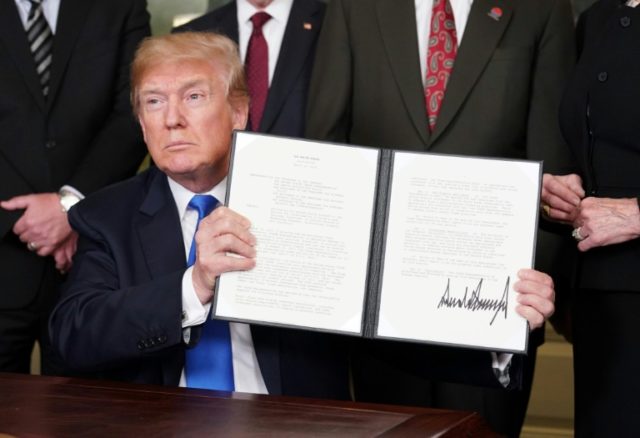Washington (AFP) – The escalating confrontation between Washington and Beijing inched closer to all-out trade war on Wednesday after China threatened retaliation against key US exports, sending global stocks lower.
Beijing unveiled plans for painful import duties targeting politically-sensitive US exports, including soybeans, aircraft and autos, to retaliate against looming US tariffs on more than 1,000 Chinese goods worth about $50 billion.
Wall Street opened sharply lower before paring some losses toward midday and trade fears also weighed global stocks.
Commerce Secretary Wilbur Ross dismissed fears the trade confrontation could endanger the world’s largest economies. He said markets should not have been “surprised” by the Chinese reaction, which was well telegraphed.
US President Donald Trump meanwhile unleashed a tweet storm, emphatically stating the United States was “not in a trade war with China” and implying he was simply fixing the mistakes of previous administrations.
Ross, in an interview with CNBC, downplayed Beijing’s retaliation, saying the $50 billion in US exports identified only amounted to about 0.3 percent of US GDP.
“So it’s hardly a life-threatening activity,” he said.
But some US markets already have responded to the trade spat with higher prices and tighter supplies even though the largest of the tit-for-tat import duties have yet to take effect.
Steel and aluminum suppliers began raising prices within 24 hours of Trump announcement last month of his intention to hit the metals with steep import tariffs, according to the Institute for Supply Management.
Industry groups renewed calls for the White House to change tack.
The powerful US Chamber of Commerce, a stalwart supporter of Republican lawmakers, said tariffs were “not the way” to achieve fairer trade with China.
And Gary Shapiro, president of the Consumer Technology Association, which represents producers and retailers dependent on Chinese manufacturing, said the tariffs were a “poison pill” for US industry.
– Will Trump blink first? –
China is the largest market for US soy and the threat of tariffs on exports of the commodity has the potential to whip up trade anxieties in stalwart Republican areas.
The American Soybean Association on Wednesday called on the Trump administration “to reconsider the tariffs that led to this retaliation.”
Republican Senator Chuck Grassley of Iowa — who represents a key soy-growing state — said Tuesday he would “do everything that I can” to prevent tariffs from hurting American agriculture.
Scott Miller, a trade policy expert at the Center for Strategic and International Studies, told AFP the tariffs proposed so far were unlikely to dent overall economic growth.
But that “does not mean there isn’t going to be a political backlash,” he said.
“I think China is perfectly happy to play a game of chicken with the United States on this because they believe the US will blink first.”
Other than steel and aluminum, the tariffs are only threat at this point: the US will have a 30-day comment period before determining the final list of Chinese goods on the hit list, and China also is holding off pending talks.
Should the tariffs go into effect, however, they would make for one of the largest trade wars ever involving the United States, said Gary Clyde Hufbauer, a trade expert at the Peterson Institute for International Economics.
The amount $50 billion “in each direction is far larger than previous trade spats that we’ve had,” he told AFP.
But Hufbauer said Trump has moderated his position repeatedly after making severe threats: compromising in negotiations on free trade agreements with South Korea, Canada and Mexico as well as exempting allies from tariffs on steel and aluminum.
But as November’s mid-term elections approach, the political ramifications of the current trade policy could be greater than the economic ones for Trump, he added.
“He’s hurting his base, he’s really annoyed a lot of Republicans in the senate and the house,” said Hufbauer.
“The way he’s going now, he’s got to compromise out to have a chance of keeping the Congress Republican in November.”

COMMENTS
Please let us know if you're having issues with commenting.